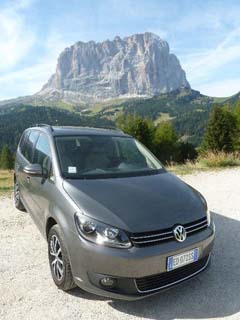|
A car not
only for the family

In the next five years, worldwide sales of CNG vehicles will
pass from 1.9 to 3, 2 million/year. The American Pike
Research institute forecast justifies the increasing
interest of car manufacturers for the automotive natural gas
market. In particular, Fiat and Volkswagen, which is about
to launch the up! (a CNG city car) and already produces more
radical solutions in the sector: the EcoFuel versions of
Passat and Touran. This latter is a MPV we tested through
the Dolomites in the 1.4 TSI Comfortline version with 7
seats. Built on the same chassis of the Golf, the third
generation of Touran shares with other VW models a sober but
elegant shape, with a particular attention to details and
aerodynamics (Cx 0.29). Rigorous style even in the interior,
thanks also to good materials and logical layout of
commands. Among them there is not the switch for fuel
conversion: the MPV has been designed to run only with
natural gas; gasoline (11-liter tank) is used only when the
gas runs out.
The wide roominess astonish: in a car 4.4 meters long, 1.8
wide and 1.7 high, the designers have managed to get 7
seats, of which five have plenty of inches and numerous
facilities, such as independent regulation of chairs,
tables, cup holder and practical storage. Less appealing are
the third-row seats, suitable for children or short trips.
The excellent versatility allows you to configure the
interior from 1 to 7 places in few seconds increasing the
luggage compartment from 121 to 1,913 litres. The only
restriction is that the third-row space steals room to gas
tanks and consequently reduces their autonomy, from 24 kg of
version 5 seats to only 18 kg.
The driving place is comfortable thanks to the high seat
providing good visibility and to adjustable seat and
steering wheel. It's easy to read instrument panel where
there is a double-indicator for levels of fuel: natural gas
and gasoline. At the wheel Touran is appreciated for the
precision of electromechanical steering wheel and gearbox,
as well as for the high acoustic comfort. The handling is
excellent too. The impression is that the front McPherson
suspension and rear four multilink, anti-roll bars,
counter-steering assistance system and electronic devices,
from Esp to EDS (Electronic Differential Lock), always do
their duty well. The main attraction is the engine, the
small twin charged 1.4 TSI obtained by compressor and
turbocharger. An advanced solution that provides 150 hp and
a driving smoothness thanks to the torque of 220 Nm
available between 1,500 and 4,500 rev / min.
These features give Touran dual personality: calm or bright.
Calm is underlined by the instantaneous consumption provided
by the onboard computer and by the dashboard indicator that
suggests the optimal gear to be used to reduce power
consumption. They convince people to travel always under
2,000 rpm / minute, unless when you drive at road code speed
(at 130 km / h, the rev counter climbs to about 2,800
g / m). The character changes by pressing on the
accelerator, an action that releases all the hp of the
4-cylinder giving good pick up and acceleration skills, even
on winding roads as the Passo Gardenia (2,121 meters height)
that we have faced. A driving style, however, that
significantly reduce the not so high fuel distance. That is
not so much. With a full tank of gas you do (since the
official data of 4.7 kg/100 km) about 380 km. That in
reality (we consumed 5.1 kg/100 km) becomes 350 if you adopt
the Eco-driving and less than 300 in case of sports driving.
We add about 150 km of the reserve gasoline to get to 500.
The real plus of EcoFuel models concern the
environmental and saving qualities: the CNG Touran emits 128
grams / km of CO2 emissions, one of the lowest values in
the segment. The release of pollutants such as carbon
monoxide and particulate are very low too, thanks to Euro 5
homologation and chemical properties of natural gas. As
regards money, Volkswagen has few rivals for operating
costs. In our test of 500 km the fuel costs was just of 22.7
euro (25.5 kg of natural gas at 0.890 euro / kg), equivalent
to 4.5 € cents / km. A fact that, even considering the
homologated consumption (4.6 l/100 km) of the less powerful
105 hp 1.6 TDI Touran is unattainable: with the diesel
engine at best you will spend at least 6.7 cents / km.
The price is not the cheapest. The Comfortline model, that
is the EcoFuel basis, costs 28,150 euro, that become 30,600
as Highline version and 32,350 if you want also the 7-speed
DSG, very efficient (average fuel consumption drops to 4.6
kg/100 km ) and user-friendly. These prices are in line with
rival diesel, the 2.0 TDI 140 hp, and about 2,200 euro
higher than the petrol variant with 1.4 TSI 140 hp engine. A
cost that can be recovered in little more than 30,000 km
thanks to the lower cost of natural gas. On the other hand,
the standard equipment is good. Right from the Comfortline
there are, among other things, numerous active and passive
safety devices, dual-zone automatic climate control,
automatic headlights and wipers, cruise control, trip
computer, chrome inserts
and steering wheel, gear knob and handbrake lever in
leather.
Stefano Panzeri
I read and... :
|
